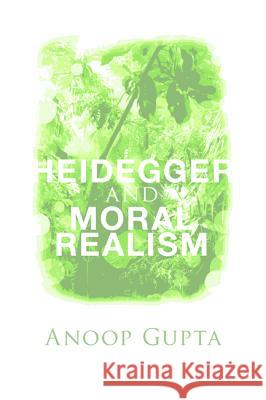Heidegger and Moral Realism » książka
Heidegger and Moral Realism
ISBN-13: 9781498203784 / Angielski / Miękka / 2015 / 196 str.
Heidegger and Moral Realism
ISBN-13: 9781498203784 / Angielski / Miękka / 2015 / 196 str.
(netto: 117,25 VAT: 5%)
Najniższa cena z 30 dni: 121,75
ok. 16-18 dni roboczych.
Darmowa dostawa!
Is it possible to found a Heideggerian ethic around the notion of a relationship to being (Bezug zum Seyn)? Going against much of the Western tradition, Gupta considers if the being-relationship could result in a feeling or mystical experience that is the basis of ethics. Along the way, such an affective and embodied approach to ethics brings us into dialogue with a range of thinkers, such as Kant and Schweitzer. Further, it is suggested that an environmental philosophy is consistent with a Heideggerian ethics. Finally, recent research in the neurosciences is marshaled to at least show the plausibility of Heidegger's brand of moral realism as it is developed. ""Thoughtful, well researched, and genuinely innovative, Anoop Gupta's Heidegger and Moral Realism opens up new perspectives for those struggling to think freshly about ethics. Gupta recasts, in multidisciplinary and comparative ways, several of Heidegger's strongly controversial views on modernity and metaphysics into much-needed, critical second thoughts about the pertinence of the environment, neurosciences, emotions, and history of philosophy for thinking through the challenges of moral realism. In today's exaggeratedly relativistic context, his book merits serious consideration."" --Peter McCormick, Fellow of the Royal Society of Canada Anoop Gupta is an instructor in the Faculty of Education and the Department of Psychology, University of Windsor, Canada. He is the author of A Common Link: Meaning-Making in Algebra and the Visual Arts (2012), Kierkegaard's Romantic Legacy: Two Theories of the Self (2005), and articles in several countries. He obtained a PhD in educational studies from the University of Windsor, specializing in cognition and learning, and holds a doctoral degree from the University of Ottawa in philosophy.
Is it possible to found a Heideggerian ethic around the notion of a relationship to being (Bezug zum Seyn)? Going against much of the Western tradition, Gupta considers if the being-relationship could result in a feeling or mystical experience that is the basis of ethics. Along the way, such an affective and embodied approach to ethics brings us into dialogue with a range of thinkers, such as Kant and Schweitzer. Further, it is suggested that an environmental philosophy is consistent with a Heideggerian ethics. Finally, recent research in the neurosciences is marshaled to at least show the plausibility of Heideggers brand of moral realism as it is developed.""Thoughtful, well researched, and genuinely innovative, Anoop Guptas Heidegger and Moral Realism opens up new perspectives for those struggling to think freshly about ethics. Gupta recasts, in multidisciplinary and comparative ways, several of Heideggers strongly controversial views on modernity and metaphysics into much-needed, critical second thoughts about the pertinence of the environment, neurosciences, emotions, and history of philosophy for thinking through the challenges of moral realism. In todays exaggeratedly relativistic context, his book merits serious consideration.""--Peter McCormick, Fellow of the Royal Society of CanadaAnoop Gupta is an instructor in the Faculty of Education and the Department of Psychology, University of Windsor, Canada. He is the author of A Common Link: Meaning-Making in Algebra and the Visual Arts (2012), Kierkegaards Romantic Legacy: Two Theories of the Self (2005), and articles in several countries. He obtained a PhD in educational studies from the University of Windsor, specializing in cognition and learning, and holds a doctoral degree from the University of Ottawa in philosophy.











